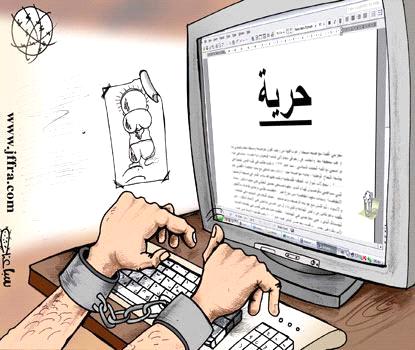Ammon News - A new cyber crime law restricting news websites is widely seen as an attempt by the Jordanian government to silence its critics
By Kamel Labidi/ The Guardian
Jordan's provisional law on cyber crimes, deviously adopted earlier this month, has brought the Hashemite kingdom a step closer to Iran, Syria, Saudi Arabia, Tunisia and Egypt, which are considered by international freedom of expression groups among the most notorious online oppressors worldwide.
"Will Jordan join the list of the top enemies of the internet?" This was the question angry bloggers, journalists and freedom of expression advocates discussed in Amman last week.
In a letter to King Abdullah II, who has repeatedly stated that "the sky is the limit" for press freedom in Jordan, the Committee to Protect Journalists asked the monarch not to endorse this restrictive and hasty legislation and to revoke another shocking government decision preventing public sector employees from accessing nearly 50 news websites.
The vaguely worded provisional information systems law was approved by ministers on 3 August. Scores of other provisional laws have been adopted by the cabinet of prime minister Samir Rifai since parliament was dissolved last year, amid accusations of corruption and ineffectiveness.
Many call the temporary legislation "unconstitutional" and accuse the government of acting as if the state of emergency lifted 20 years ago is still in force. The Jordan Professional Associations Complex said the government "has once again violated the constitution by issuing more temporary laws that are not of an urgent nature, as stipulated in Article 94a of the Jordanian constitution."
Article 13 of this threatening cyber crimes law gives the police a green light to storm into the offices of websites and access their computers without prior authorisation from public prosecutors. "Under this law, bloggers committed to independent journalism are now on an equal footing with credit card thieves and individuals running websites promoting pornography or terrorism," says Basil Okoor, co-owner and managing editor of Ammonnews.net, one of Jordan's most visited websites..
Like many independent journalists and human rights lawyers, Okoor firmly believes that the main reason behind the government rush to impose this infamous law is to bring those "playing a leading role in mirroring people's reactions to the government's policies and giving voice to its critics" under its thumb.
Unlike radio and TV stations and the print media, news websites remained, until early August, outside what Okoor called the government's "house of obedience". This law, coupled with the decision to keep hundreds of thousands of government employees in the dark by denying them access to nearly 50 news websites, is widely seen as a dangerous assault on freedom of expression. "The government is not targeting specific websites. The ban includes [daily newspapers'] websites as well as the government's own news agency, Petra," Ali al-Ayed, minister of media affairs and communication told journalists. He claimed that the decision was aimed at "boosting the performance of public employees".
Attempts to put news websites and bloggers on a tight leash started to escalate in January when the court of cassation, Jordan's highest judicial authority, issued a rather ominous ruling recommending the restrictive press and publications law be extended to online news sites and other electronic media.
In May, the state security court banned news media from covering corruption allegations involving the Jordan Petroleum Refinery Company and several national figures.
This ruling coincided with what many described as a "government-backed media campaign" against news websites, whose criticism of government policies and increasing influence among Jordanians seemed to have become intolerable among thin-skinned, high-ranking officials.
"One of the top priorities of this government is to silence the most vibrant and influential media outlets to please entrenched pressure groups. They want to muzzle journalists and turn the media into a government megaphone," said Okoor.
Even figures traditionally close to the government, such as Saleh Qallab, the former minister of information and columnist for the government's daily, al-Rai, seem disturbed by the continuing crackdown on bloggers. "Cracking down on them is not a solution, because we do not want the government to silence the voices of its critics," said Qallab, whose declared wish 10 years ago to become Jordan's last minister of information did not come true.
** Kamel Labidi is a Tunisian journalist and Middle East consultant for the committee to protect journalists
